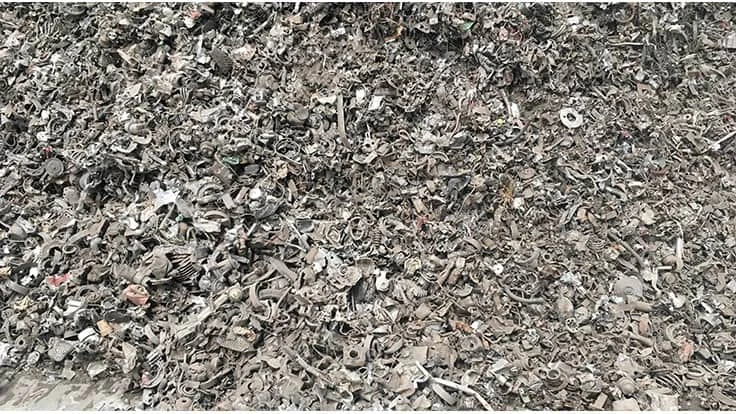
Photo by Brian Taylor.
A presentation by a Malaysia-based cargo inspection and certification service obtained by the Brussels-based Bureau of International Recycling (BIR) paints a picture of a nation preparing to enforce a stricter scrap metal import regimen.
According to Selangor, Malaysia-based SIRIM QAS International Sdn. Bhd., that nation’s Ministry of International Trade and Industry (MITI) could require all metal scrap export cargoes to Malaysia to be subject to a preshipment inspection process.
Washington-based Institute of Scrap Recycling Industries (ISRI) Vice President of Advocacy Adina Renee Adler tells Recycling Today the Malaysian government was seeking comments on the proposed legislation through March 9, with ISRI submitting its questions, comments and suggestions as of that date.
In a March 12 update to its original March 8 posting, BIR says it received the presentation from the Selangor-based Malaysian Non Ferrous Metal Association, and that the “guidelines are to be considered purely indicative by BIR members.”
The presentation by SIRIM, which describes itself as being “wholly owned” by Malaysia’s Ministry of Finance, also indicates metal scrap in “crushed form is not allowed for importation.” It is not clear if “crushed” refers to shredded or baled scrap.
The future of baled wire and cable shipments also seems imperiled, as all inspected and approved nonferrous shipments would have to meet a 94.75 percent metallic content threshold.
Nonferrous traders contacted by Recycling Today have expressed concern about the future viability of imported scrap into Malaysia if the new regimen is carried out as described by SIRIM. In the past few years, the country has served as a place where lower grades of scrap can be upgraded into higher grades or ingots for shipment to China.
One trader says there will be “no need” to ship the same high grades to Malaysia if they can now be delivered directly to Chinese ports.
Another trader comments, “A number of metal recyclers who moved from South China to Malaysia may be forced to move yet again.”
In the ferrous sector, the Malaysia-based Southeast Asia Iron and Steel Institute (SEASAI) has not issued a reaction to the SIRIM inspection guidelines. Many of SEASAI’s members, however, consume imported ferrous scrap. In 2020 alone, the United States shipped some 1.58 million tons of ferrous scrap to Malaysia, according to U.S. Census Bureau data.
The organization expressed concern in 2020 about an “influx of proposed investment from China of up to 50 million metric tons of production capacity” in the region that would put profitability pressure on scrap-fed electric arc furnace (EAF) producers. Adding difficulties to those EAF producers’ ability to obtain scrap is unlikely to be viewed favorably.
SIRIM indicates the rules being clarified stem from a government order dating back to 2017. A 23-page guideline document issued by SIRIM and posted to the BIR website provides details on how that order is now intended to be enforced.
SIRIM also says it is the agency through which an inspection process will run, and its presentation includes a chart listing the cost of inspections, inspector travel expenses and postinspection certificates.
According to the agency, all ferrous and nonferrous shipments would have to arrive by sea, rather than traveling across any of the nation’s land borders with Thailand, Indonesia, Brunei or Singapore (via which it is linked by road transportation causeways).
Sea containers or bulk cargoes would require preinspection by SIRIM or another “accredited inspection body” and would need to have a Certificate of Approval (CoA). The CoA, says the inspection agency, would require a “bank guarantee” and can only be purchased by companies in Malaysia that have an “approved manufacturing license from MITI.”
In Malaysia, a bank guarantee is defined as “an irrevocable commitment by a bank to pay an agreed sum to the beneficiary in the event that the party requesting to the guarantee fails to perform its obligations or liability to the beneficiary,” according to Kuala Lumpur, Malaysia-based Affin Bank.
Plastic is seen as an unwanted contaminant in ferrous and nonferrous scrap shipments, with Malaysia’s MITI having set a 0.25 percent threshold on plastic found in scrap metal cargoes. The tolerance for “electrical and electronic” scrap has been set at zero percent.
Shipments found out of compliance, according to SIRIM, would be returned to the country of origin. The agency also says funds from the “bank guarantee [tied to the CoA] will be used by SIRIM as transportation and incidental costs particularly for shipment that will have to be returned to the country of origin.”
SIRIM says it is encouraging overseas inspection agencies or companies to apply to become an accredited foreign inspection body (FIB) by contacting the agency at cserviceqas@sirim.my.
Latest from Recycling Today
- Lautenbach Recycling names business development manager
- Sebright Products partners with German waste management equipment company
- WasteExpo transitions to biennial format for enhanced experiences
- Study highlights progress, challenges in meeting PCR goals for packaging
- Washington legislature passes EPR bill
- PureCycle makes progress on use of PureFive resin in film trials
- New copper alloy achieves unprecedented high-temperature performance
- Gränges boosts profits and sales volume in Q1 2025





